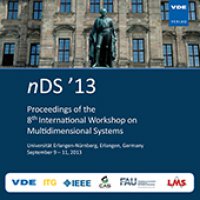Yoneda product of multidimensional systems
Conference: nDS '13 - Proceedings of the 8th International Workshop on Multidimensional Systems
09/09/2013 - 09/11/2013 at Erlangen, Deutschland
Proceedings: nDS '13
Pages: 6Language: englishTyp: PDF
Personal VDE Members are entitled to a 10% discount on this title
Authors:
Quadrat, Alban (Inria Saclay, Île-de-France, DISCO project, L2S, Supélec, 3 rue Joliot Curie, 91192 Gif-sur-Yvette Cedex, France)
Abstract:
The paper aims at developing the algebraic analysis approach to multidimensional systems and behaviours. Within the algebraic analysis approach, if D is a (noncommutative) polynomial ring in n functional operators and F a signal space, i.e., a left D-module, then a behaviour B can be defined as homD(M,F), i.e., as the dual of a (left) D-module M finitely presented by a matrix R E D(exp q×p) defining the multidimensional system. The homomorphisms from a behaviour C to a behaviour B can be studied by means of the (left) D-homomorphisms from M to N, where M and N are respectively the (left) D-module defining B and C. Within algebraic analysis, a linear system is not only defined as a behaviour ext0 D (M,F):= homD (M,F) but as the collection of n+1 vector spaces {ext(exp i) D (M,F)} i=0,...,n, defining the solvability in F of the successive compatibility conditions induced by the multidimensional system. If the signal space F is rich enough (i.e., is an injective left D-module), then {ext(exp i) (M,F)} i=0,...,n reduces to the behaviour ext0 D (M,F). In this paper, we generalize the homomorphisms of behaviours to consider the full characterization of a linear system as {ext(exp i) D (M,F)} i=0,...,n. To do that, we explicitly characterize the abelian group ext(exp i) D (M,N) and the maps: .......... The classical behaviour homomorphisms correspond to i = j = 0.


